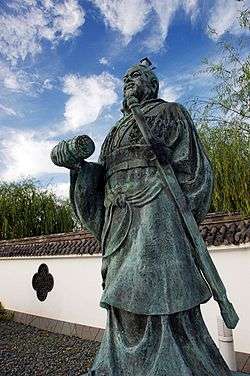Sun Tzu

It's one thing to know Every Trick in the Book, but this is the guy who wrote the book.
Sun Tzu (also rendered as Sun Zi) was a Chinese military general, strategist and philosopher who lived in the Spring and Autumn Period of ancient China. The name he is best known by is actually an honorific which means "Master Sun": his birth name was Sun Wu and he was known outside of his family by his courtesy name Changqing. He is traditionally credited as the author of The Art of War, an extremely influential ancient Chinese book on military strategy. Sun Tzu has had a significant impact on Chinese and Asian history and culture, both as the author of The Art of War and as a legendary historical figure.
Sun Tzu's historicity is uncertain. Sima Qian and other traditional historians placed him as a minister to King Helü of Wu and dated his lifetime to 544–496 BC. Modern scholars accepting his historicity nonetheless place the existing text of The Art of War in the later Warring States period based upon its style of composition and its descriptions of warfare. Traditional accounts state that the general's descendant Sun Bin also wrote a treatise on military tactics, also titled The Art of War. Since both Sun Wu and Sun Bin were referred to as Sun Tzu in classical Chinese texts, some historians believed them identical prior to the rediscovery of Sun Bin's treatise in 1972.
Sun Tzu's work has been praised and employed throughout East Asia since its composition. During the twentieth century, The Art of War grew in popularity and saw practical use in Western society as well. It continues to influence many competitive endeavors in Asia, Europe, and America including culture, politics, business, and sports, as well as modern warfare.
- Big Book of War: Based on his own book on the subject -- which ironically is very concise.
- Mary Tzu: a portmanteau of Mary Sue and his name.
- Ass in Ambassador: This trope was decried in Sun Tzu's work as a bad idea, as he emphasized that skillful diplomacy was important to the health of the state and as important to warfare as the sword.
- Combat Pragmatist: Most of the strategies he advocated were those that would win battles and end wars. Whether they were fair or honorable was a secondary concern at best.
- Serious Business: He was once assigned by his emperor to turn a harem of concubines into an army. While it sounded like a joke assignment, he took it absolutely seriously, to the point he even executed for insubordination two concubines favored by the emperor, over the emperor's protest, citing he was ordered to make them into an army, and thus he was executing officers who would not obey; he had to fulfill his original orders despite his superior's objections. The rest of the concubines fell in line and did as they were told from that point onwards.
- The Stoic: Sun Tzu was a follower of Taoism, and thus advocated the ideal general and person should be serene and unshakable.